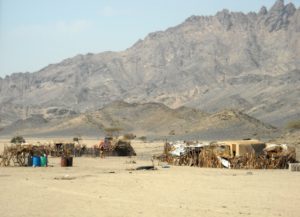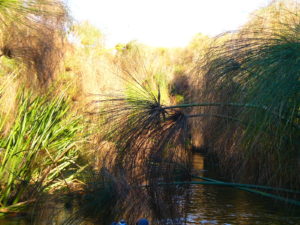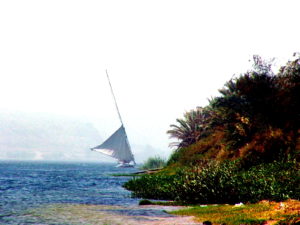19 Apr East Africa — Mooching along with a Pig Farmer – 4
To get from Ethiopia to Alexandria you have to cross Sudan. Which wouldn’t have been a problem if the pig farmer and I had both been British. But we weren’t. I was American and that complicated things. America was the only country in the world to call bullshit on the gang of thugs who ran Sudan, and they hadn’t taken it well.

The kind of thing I was looking forward to seeing in Sudan
I was living in Rabat when the pig farmer invited me on the trip and, four months before setting out, walked down to the Sudanese Embassy to see about getting a visa. When I showed up, the gate was standing open and the guard was . . . well, it was hard to tell where the guard was. I explored around the neighborhood and located him on the far side of the street, lounging under a tree with a guard from a private home. “Just go on in,” he waved toward the gate, and I did.
If you’re American and need to defect, my suggestion is, consider Sudan because the guard will wave you right through. Not that Sudan will let you into the country. There’s no way they’re going to do that, but defecting onto Sudanese soil by way of stepping into one of their embassies is a snap.
The embassy was an old house, a big, rambling, rundown old house Sudan must have picked up on the cheap, surrounded by a somewhat-tended lawn. No Marines were guarding the place. Not even, as far as I could tell, were any video cameras checking me out. I knocked on the door. It was a big, old door that needed painting.
Nobody answered, so I let myself in.
I can’t say it was dark in there, not exactly, but there didn’t seem to be a lot of money squandered on electricity, either, just a formal entry hall that didn’t look so formal, anymore, what with the beat-up furniture. Other than admiring photographs of the indicted-for-crimes-against-humanity criminals who ran the country, there didn’t seem to be anybody around. So I sat down and waited. Surely, someone would come along and ask what I was doing there.
No one did.
When I got tired of being stared at by pictures of people who’d committed crimes against humanity, I went exploring and let myself into an empty office. If Sudan had had any secrets to steal, I could have absconded with the whole country. I opened a few more doors, examined a few more empty offices, detected the sound of machinery and came to a chamber with a charming lady running a copy machine. “I’m here for a visa,” I said, feeling like I’d arrived at the inner sanctum of Sleeping Beauty’s castle.
“Oh yes,” she stopped copying. “The consul will see you immediately.” She was so gracious she made me feel as if Sudan had been expecting me. As if having the opportunity to give me a visa was what they’d been hoping for all morning.
The consul was a slender, African gentleman, middle-aged and very well-mannered. He led me into his office, we chatted about his country, he gave me tips on things to see while I was there, then he sent for tea and we chatted some more. After about an hour he thanked me for coming. “I have to send your application to Khartoum,” he said. “Just a formality. We’ll call you in ten days, maybe sooner. The visa will be waiting for you,” and walked me to the door. We chatted a bit more, discussed the virtues of his car sitting in the driveway, shook hands and that was that. The visa was in the bag.
Three or four weeks later when I hadn’t heard anything, I went back to the embassy. The consul was there, I could tell by the car. It was just my bad luck he was in a meeting with the ambassador. So I took a seat beneath the unblinking, photographic gaze of criminals against humanity, and waited.
A very long time later, the consul brushed by. “Not yet,” he said, “Soon. No time to talk.” He had important consul duties to tend to. Then, “It won’t help matters for you to keep coming here,” making it clear that we wouldn’t be meeting again.
I tried one more time, the day before I headed out for Kenya, but luck wasn’t with me. The consul wasn’t there. I could see why. He’d left his car in the embassy driveway and hadn’t had any way to get to work. The next day I joined the pig farmer.
In Nairobi, we drove to the Sudanese embassy, and I’m not sure there was a guard there at all. He may have been off relaxing in a neighbor’s yard but you couldn’t prove it by me. Inside the embassy, there wasn’t much of a line at the visa window and it went quickly, just a few Europeans, the pig farmer, and me moving right along. “You’re from Germany?” the lady in the window said to whomever was at the head of the line. “Here’s your visa. Next, please.”
“France? Here’s one for you. Next? Holland? Here, take three.”
“Three?”
“You might want to bring friends. Next.” It was my turn.
“America?” she gave me a suspicious look. “Come back in ten days.”
“Ten days?” This was beginning to sound like a pattern.
“I need to send your application to Khartoum.”
“You’ll have a visa for me in ten days?”
“I’ll have an answer.”
Well, there was always Addis Ababa. “Addis,” the pig farmer told me, “is the go-to place for a visa if you want to cross into Sudan by land.
There were a lot of interesting things in Addis but something they did not have was visas to Sudan, at least not for me “You’re American?” the visa lady gave me the look. “I have to send this to Khartoum. Check back in ten days.”
The last day before we reached the Sudanese border the pig farmer dropped me off at the airport in Gondar, a town north of where the Blue Nile tumbles out of Lake Tana. At the entrance to the airport, someone who claimed to be a policeman shoved his way into the back of the guided-missile carrier. “Just for a look around,” he said. He was carrying an AK47 and his AK47 looked like it worked. But I was an old Ethiopia hand by then, I knew the drill, and shoved him back out. Afterwards, I flew home and the pig farmer continued on to Sudan.
Two weeks later I got into an online chat with his wife. She wasn’t in Alexandria, she was in Aswan at the very southern edge of Egypt waiting for him to emerge from Sudan. Since she was American, she couldn’t get a visa to go in and retrieve him. “He’s okay,” she said. “Physically.”
Physically?
She said he was still in Khartoum. “He’s well enough to fly out but he won’t leave that Guided-missile carrier.”
She told me that eighteen hours after he dropped me off, he’d been flattened by an especially virulent form of malaria.
I don’t know this, but I’m pretty sure he picked it up one of the nights he slept in the Guided-missile Carrier to avoid spending twenty-five dollars on a hotel room. For the first time, I began to have some sympathy for his wife.
The weather had been cool in Ethiopia, up at seven or eight-thousand feet, and dry. It wasn’t that way when he crossed into Sudan. The southern part of Sudan is the Sudd, where the White Nile flattens out into an enormous swamp filled with reeds and heat and humidity.
It was those reeds, and the heat and the humidity, that kept two-thousand years of Europeans from following the Nile to its source. In July, the place was so hot the pig farmer didn’t notice he was running a hundred-and-five degree fever.
A family from Holland driving by in a firetruck found him unconscious on the side of the road.

Papyrus: what I imagine the Sudd looked like as he was passing out
They packed him in ice, put their teenaged son in charge of following along in the guided-missile carrier, and he regained consciousness in a military hospital in Khartoum. When he was well enough to drive, he got behind the wheel, aimed north, and went about seven kilometers before blowing a head gasket.
He had the guided-missile carrier towed back to Khartoum and located a mechanic. The mechanic didn’t have any head gaskets for guided-missile carriers on hand but he was African and, therefore, crazy resourceful. He pounded a new head gasket out of a coffee can, installed it, and off my friend drove. For a few more kilometers before blowing the head gasket. The mechanic may have been African and he may have been resourceful, but John Z DeLorean couldn’t have made a head gasket out of a coffee can. Coffee cans aren’t the right kind of metal. This is where the pig farmer was when I chatted with his wife. From Khartoum, he had the Guided-missile carrier towed all the way to Lake Nasser.
Egypt and Sudan don’t like each other and, even though there’s a perfectly good road running between the two countries, the road has never opened. The only way to get to Egypt from Sudan is to cross the Sahara by boat. Which means you sit at the south end of Lake Nasser until Wednesday, load onto the one ferry a week that goes north or, in the case of the pig farmer, get towed onto the ferry, ride in style to the Egyptian end of the lake, get towed off and say hello to your American wife. I hoped she’d brought along a lot of crossword puzzles. It was going to be a while.

Cool and breezy on the Nile: what I imagined Aswan must have felt like
From Aswan, they had the Guided-missile carrier towed halfway up Egypt to Luxor. Luxor, he emailed me after he’d finally gotten checked into an air-conditioned hotel, is the home of a first-rate Land Rover mechanic. “Learned all about them in the Egyptian army.”
Hold the phone, I thought. EGYPTIAN army? I was pretty sure Egypt used American equipment and, before that, Soviet, so I checked. Sometimes you can learn about things on Google that the people who own the things wouldn’t tell you if you asked, and I came up with a list of Egyptian army vehicles down to the VIN numbers, almost. And none of them came with a Made-in-Great-Britain label.
“Be careful about this mechanic,” I emailed the pig farmer.
“Nothing to be careful about,” he emailed back. “The fellow has located a head gasket in Cairo. Have it here in eight days, he’ll pop it in and, off we go.”
The head gasket arrived right on schedule, the mechanic popped it in and off they went. For another seven-or-so kilometers before it blew. This time they arranged to have the Guided-missile carrier towed to Alexandria, 2,500 kilometers from Khartoum where it had first stopped working. In Alexandria he could load it onto a freighter bound for South Hampton. It would have been a straight shot if the Egyptian police hadn’t become curious about this foreigner who wanted to tow a guided-missile carrier the entire length of their country, and spent most of a day questioning him about it.
In a hut.
With a tin roof.
In the Western Desert.
In July.
Hearing all this, hearing about the trip I hadn’t gotten to take, well it stirred up feelings on my part. Mainly of gratitude. I need to write notes, I thought, to three separate Sudanese embassies thanking them for not letting me into their country.


No Comments